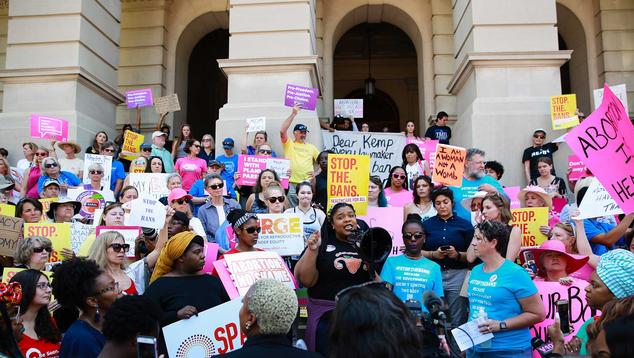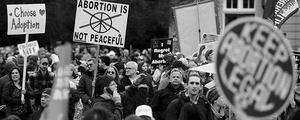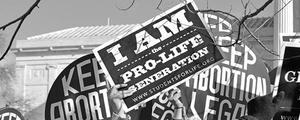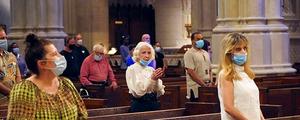Black Americans have become more likely to support abortion rights over the past decade, and they are now as likely as non-Black Americans to say that abortion is morally acceptable and slightly more likely to support legal abortion in all circumstances. This marks a significant change from the situation 15 to 20 years ago for Black Americans, while attitudes among the rest of the U.S. population have stayed relatively constant.
Do you think abortions should be legal under any circumstances, legal only under certain circumstances or illegal in all circumstances?
| Black Americans | Non-Black Americans | |||||||||||||||||||||||||||||||||||||||||||||||||||||||||||||||||||||||||||||||||||||||||||||||||||
|---|---|---|---|---|---|---|---|---|---|---|---|---|---|---|---|---|---|---|---|---|---|---|---|---|---|---|---|---|---|---|---|---|---|---|---|---|---|---|---|---|---|---|---|---|---|---|---|---|---|---|---|---|---|---|---|---|---|---|---|---|---|---|---|---|---|---|---|---|---|---|---|---|---|---|---|---|---|---|---|---|---|---|---|---|---|---|---|---|---|---|---|---|---|---|---|---|---|---|---|---|
| Abortion: % Morally acceptable | ||||||||||||||||||||||||||||||||||||||||||||||||||||||||||||||||||||||||||||||||||||||||||||||||||||
| 2001-2007 | 31 | 41 | ||||||||||||||||||||||||||||||||||||||||||||||||||||||||||||||||||||||||||||||||||||||||||||||||||
| 2017-2020 | 46 | 43 | ||||||||||||||||||||||||||||||||||||||||||||||||||||||||||||||||||||||||||||||||||||||||||||||||||
| Abortion: % Legal under any circumstances | ||||||||||||||||||||||||||||||||||||||||||||||||||||||||||||||||||||||||||||||||||||||||||||||||||||
| 2001-2007 | 24 | 25 | ||||||||||||||||||||||||||||||||||||||||||||||||||||||||||||||||||||||||||||||||||||||||||||||||||
| 2017-2020 | 32 | 27 | ||||||||||||||||||||||||||||||||||||||||||||||||||||||||||||||||||||||||||||||||||||||||||||||||||
| Gallup | ||||||||||||||||||||||||||||||||||||||||||||||||||||||||||||||||||||||||||||||||||||||||||||||||||||
These data are based on aggregated samples of interviews conducted as part of Gallup's May "Values and Beliefs" polls from 2001 to 2007 and from 2017 to 2020.
This shift in Black Americans' attitudes has not occurred in a vacuum and appears to be closely tied to increasing political polarization on abortion. Party identification is a core demographic variable of interest in today's social, political and cultural environment. Since over three-quarters of Black Americans identify with or lean toward the Democratic Party, any broad trends that differentially affect Democrats' attitudes about abortion are -- everything else being equal -- going to affect Black Americans' as well.
Democrats' abortion attitudes have shifted significantly over the past decade. Democrats have become increasingly more likely to say abortion is morally acceptable and to say that abortion should be legal in all circumstances, while Republicans' more conservative attitudes on both measures have remained roughly stable.
Do you think abortions should be legal under any circumstances, legal only under certain circumstances or illegal in all circumstances?
| Democrats/Democratic leaners | Republicans/Republican leaners | |||||||||||||||||||||||||||||||||||||||||||||||||||||||||||||||||||||||||||||||||||||||||||||||||||
|---|---|---|---|---|---|---|---|---|---|---|---|---|---|---|---|---|---|---|---|---|---|---|---|---|---|---|---|---|---|---|---|---|---|---|---|---|---|---|---|---|---|---|---|---|---|---|---|---|---|---|---|---|---|---|---|---|---|---|---|---|---|---|---|---|---|---|---|---|---|---|---|---|---|---|---|---|---|---|---|---|---|---|---|---|---|---|---|---|---|---|---|---|---|---|---|---|---|---|---|---|
| Abortion: % Morally acceptable | ||||||||||||||||||||||||||||||||||||||||||||||||||||||||||||||||||||||||||||||||||||||||||||||||||||
| 2001-2007 | 50 | 30 | ||||||||||||||||||||||||||||||||||||||||||||||||||||||||||||||||||||||||||||||||||||||||||||||||||
| 2017-2020 | 62 | 26 | ||||||||||||||||||||||||||||||||||||||||||||||||||||||||||||||||||||||||||||||||||||||||||||||||||
| Abortion: % Legal under any circumstances | ||||||||||||||||||||||||||||||||||||||||||||||||||||||||||||||||||||||||||||||||||||||||||||||||||||
| 2001-2007 | 34 | 16 | ||||||||||||||||||||||||||||||||||||||||||||||||||||||||||||||||||||||||||||||||||||||||||||||||||
| 2017-2020 | 43 | 14 | ||||||||||||||||||||||||||||||||||||||||||||||||||||||||||||||||||||||||||||||||||||||||||||||||||
| Gallup | ||||||||||||||||||||||||||||||||||||||||||||||||||||||||||||||||||||||||||||||||||||||||||||||||||||
Thus, it is a reasonable assumption that the shift in Black Americans' attitudes toward abortion is related to the shift among Democrats more broadly. To isolate the relationship among these variables more precisely, the accompanying table displays abortion attitudes among three groups: Black Democrats, Black non-Democrats and non-Black Democrats.
Do you think abortions should be legal under any circumstances, legal only under certain circumstances or illegal in all circumstances?
| Abortion: % Morally acceptable | Abortion: % Legal under any circumstances | ||||||||||||||||||||||||||||||||||||||||||||||||||||||||||||||||||||||||||||||||||||||||||||||||||
|---|---|---|---|---|---|---|---|---|---|---|---|---|---|---|---|---|---|---|---|---|---|---|---|---|---|---|---|---|---|---|---|---|---|---|---|---|---|---|---|---|---|---|---|---|---|---|---|---|---|---|---|---|---|---|---|---|---|---|---|---|---|---|---|---|---|---|---|---|---|---|---|---|---|---|---|---|---|---|---|---|---|---|---|---|---|---|---|---|---|---|---|---|---|---|---|---|---|---|---|
| 2001-2007 | 2017-2020 | 2001-2007 | 2017-2020 | ||||||||||||||||||||||||||||||||||||||||||||||||||||||||||||||||||||||||||||||||||||||||||||||||
| Black Democrats | 34 | 50 | 27 | 35 | |||||||||||||||||||||||||||||||||||||||||||||||||||||||||||||||||||||||||||||||||||||||||||||||
| Black non-Democrats | 20 | 34 | 11 | 22 | |||||||||||||||||||||||||||||||||||||||||||||||||||||||||||||||||||||||||||||||||||||||||||||||
| Non-Black Democrats | 53 | 66 | 36 | 45 | |||||||||||||||||||||||||||||||||||||||||||||||||||||||||||||||||||||||||||||||||||||||||||||||
| Gallup | |||||||||||||||||||||||||||||||||||||||||||||||||||||||||||||||||||||||||||||||||||||||||||||||||||
Several conclusions arise from consideration of these data:
- The rising tide of liberalism among Democrats on the abortion issue has occurred among both Black Democrats and non-Black Democrats.
- At the same time, abortion attitudes among Black Americans who are not Democrats have also become more liberal.
- The relative hierarchy of liberalism on abortion issues has remained constant: Black non-Democrats are still less liberal on abortion than are Black Democrats, and in turn, Black Democrats are still less liberal than non-Black Democrats.
- These patterns underscore the importance of political party identification on abortion attitudes, given that Democrats -- both Black and non-Black -- have shifted essentially in lockstep over the years.
- At the same time, it is evident that party identification does not explain everything. Black Americans who do not identify with the Democratic Party have become more liberal on abortion, just as has been the case among Black Americans who are Democrats.
Religion Could Be a Factor
As Gallup pointed out in a 2008 analysis of data on race, party and abortion, the fact that Black Democrats remain somewhat less liberal than non-Black Democrats on abortion could have to do with the relative difference in religiosity between these two groups. Religion was then and is now highly correlated with attitudes toward abortion.
Both Black Democrats and non-Black Democrats have become less likely to report attending religious services over time, but the religious gap between these two groups remains. Black Democrats are substantially more religious than non-Black Democrats on this measure, helping explain the gap in attitudes toward abortion.
| % Attend church weekly or almost weekly | |||||||||||||||||||||||||||||||||||||||||||||||||||||||||||||||||||||||||||||||||||||||||||||||||||
|---|---|---|---|---|---|---|---|---|---|---|---|---|---|---|---|---|---|---|---|---|---|---|---|---|---|---|---|---|---|---|---|---|---|---|---|---|---|---|---|---|---|---|---|---|---|---|---|---|---|---|---|---|---|---|---|---|---|---|---|---|---|---|---|---|---|---|---|---|---|---|---|---|---|---|---|---|---|---|---|---|---|---|---|---|---|---|---|---|---|---|---|---|---|---|---|---|---|---|---|
| 2001-2007 | 2017-2020 | ||||||||||||||||||||||||||||||||||||||||||||||||||||||||||||||||||||||||||||||||||||||||||||||||||
| Black Democrats | 56 | 46 | |||||||||||||||||||||||||||||||||||||||||||||||||||||||||||||||||||||||||||||||||||||||||||||||||
| Non-Black Democrats | 35 | 25 | |||||||||||||||||||||||||||||||||||||||||||||||||||||||||||||||||||||||||||||||||||||||||||||||||
| Gallup | |||||||||||||||||||||||||||||||||||||||||||||||||||||||||||||||||||||||||||||||||||||||||||||||||||
Implications
Abortion is a defining issue in modern American politics, and this presidential election cycle appears to be no exception. About half of Republicans and Democrats say that a candidate's position on abortion will be one of many important factors they take into account when voting, with another quarter of each group saying that a candidate must share their views to gain their vote.
During their recent convention, Republicans made the effect of a Joe Biden presidency on abortion and abortion-related policies a centerpiece of their criticism of the Democratic nominee, and other critics have juxtaposed Biden's pro-abortion rights position against his personal religious identity as a faithful Catholic.
Abortion is particularly salient to highly religious Americans. Black Americans are one of the most religious racial/ethnic groups in the U.S. As shown in this analysis, Black Americans have become more liberal on abortion over time, but they remain more conservative than their fellow Democrats. At the same time, Black Americans -- both Democratic and non-Democratic -- remain more liberal on abortion than Republicans.
All of this raises the question of the degree to which the anti-abortion positioning of Donald Trump's campaign could affect voting and turnout among Black voters. History and current analyses of Trump's job approval among Black Americans do not suggest a shift in Black Americans' overwhelming propensity to vote for the Democratic nominee for president. But considering the greater diversity of views on abortion among Black Americans than among Democrats more generally, it is at least within the realm of possibility that Black voters who are personally anti-abortion will be negatively affected by Biden's abortion position. More generally, Biden is going to have to maintain his support for abortion rights as expected by progressives while attempting to maintain enthusiasm among Black Americans and other religiously oriented voting segments.




